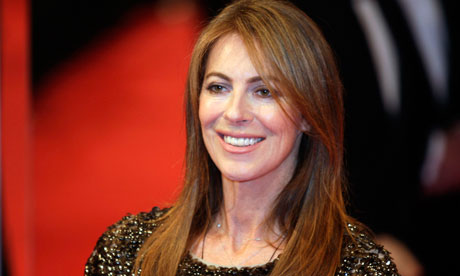
Few cities are more practised in the garish arts of public exposure than Los Angeles and at no time of year is this knowledge put to better use than Oscars week.
This year, however, the biggest debates in the runup to Sunday's annual evening of backslapping and schmoozing have revolved around who could do with a bit more recognition.
After Kathryn Bigelow became the first woman to be given the best director award at last year's Oscars, there was hope that a traditionally male-dominated barrier had been broken at last. This hope looked all the more plausible because of the number of critically lauded films released in the wake of her award directed by women, notably Winter's Bone, directed by Deborah Granik, and The Kids are All Right, by Lisa Cholodenko.
Yet while both of these movies have been nominated for best film, and both feature actors who have received nominations, their directors have been ignored.
"Last year Kathryn opened doors for female directors so I was particularly disappointed that Lisa didn't get a nomination," says Celine Rattray, producer of The Kids are All Right.
Notably, the subject matter of Bigelow's film, The Hurt Locker, was war and there was only one woman in the cast, raising the question whether a woman might be able to win a film award, but she has to make a very masculine film to do so.
"I think the nominations this year in general were for flashy movies and maybe The Kids are All Right was just a little too heartfelt," suggests Rattray.
Others have claimed that Bigelow's triumph was not so much the breaking of a ceiling but a mere blip: "After Kathryn Bigelow's supremely satisfying double win for best director and best picture last year, it's particularly disheartening to see Winter's Bone and The Kids are All Right, both made by women, relegated to 'great film—who directed it again?' status," Dana Stevens wrote on Slate.com.
Another demographic notably more absent from this year's nominations are non-Caucasians. Last year Mo'Nique won best supporting actress for the film Precious. This year there is not one non-Caucasian face in any major category, prompting writer John Farr to pen a tribute to Sidney Poitier on The Huffington Post last week in protest against this "mostly Caucasian Oscar year." In the article Farr describes Poitier as "an authentic groundbreaker" but judging by this year's nominations, a lot of old ground remains firmly intact.
One person who is managing to be both underexposed and overexposed is the British artist Banksy, whose film, Exit Through the Gift Shop, has been nominated for Best Documentary Feature. Banksy 's famous aversion to public scrutiny has not only augmented his fame in Britain but has, perhaps inevitably, made him the object of deep fascination to the Hollywood community, enthralled by what they see as his nigh on perverse dislike of being recognised.
Various celebrities, including Will Arnett from the cult TV show Arrested Development, have spent the week putting up photos on Twitter of street art in LA that appears to be made by Banksy, indicating that he is in town. The question of whether he will or won't turn up to the ceremony has arguably made the Best Documentary Feature category the most talked about category at the Oscars this year – a flame that has been fanned by the hemming and hawing of the academy over whether they will allow him to attend in disguise. Initially, Academy president, Tom Sherak, huffed that "if Banksy isn't comfortable showing his face on the Kodak stage, then the Academy isn't comfortable having him on that stage".
But late this week, Sherak changed his mind. Somewhat belatedly, one might think, he claimed to "get" Banksy ("I'm looking at what Banksy's done and that's fun") and told The Hollywood Reporter that if Banksy got up on stage masked "I'm not gonna stand up to stop him."
Yet while the academy issues contradictory and increasingly ridiculous statements, Banksy remains characteristically silent and his spokesperson, Jo Brooks, had only this to say on the artist's attendance: "No comment." Was he even in LA? "No comment."
The only nominee more talked about than the invisible Banksy is the all too visible James Franco, who is fast turning into the Zelig of celebrities, apparently involved in every aspect of American culture. Not content with being both the host of the ceremony and a best actor nominee, this week he opened an art exhibition in LA with director Gus van Sant, entitled Unfinished, as advertised by giant billboards across the city, all emblazoned with Franco's face. And just in case that still is not enough Franco, the actor joined Twitter this week, posting a link to a video of himself as his debut tweet, thereby slaking the thirst of anyone who hadn't seen his face for more than two seconds.
0 comm. for this post